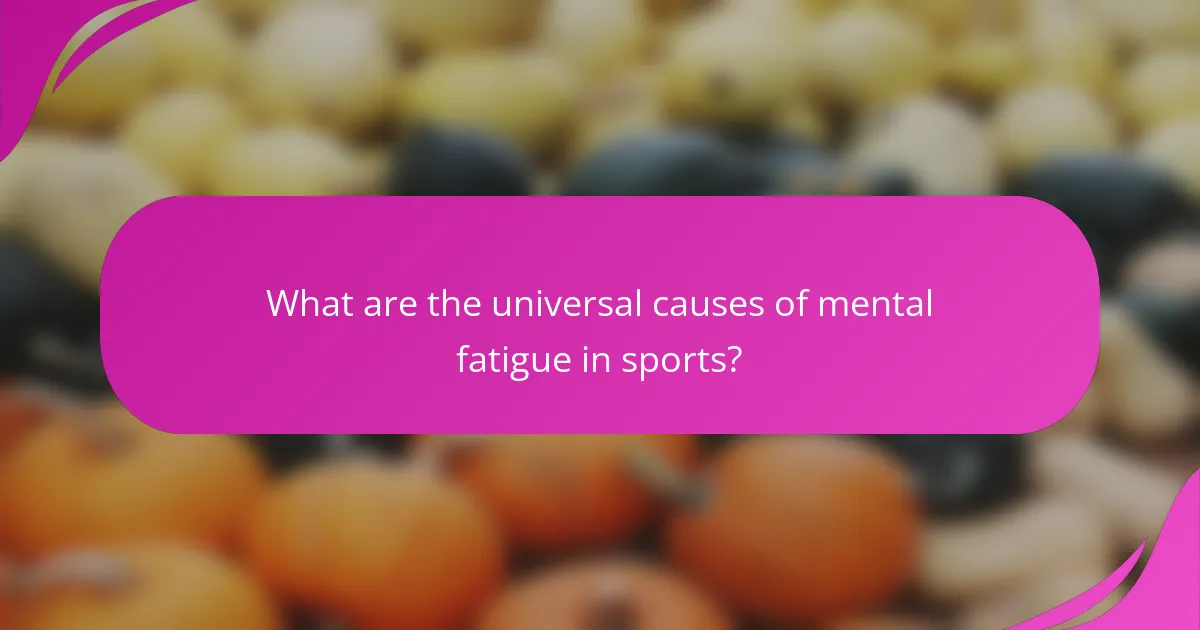Mental fatigue can severely hinder athletic performance, affecting focus, motivation, and decision-making. Recognising symptoms like decreased concentration and emotional instability is crucial. Effective recovery strategies, including proper rest, mindfulness practices, and nutrition, can enhance mental clarity. Understanding the unique causes of mental fatigue in sports is essential for optimal performance and well-being.

What is Mental Fatigue and How Does it Affect Athletes?
Mental fatigue significantly impacts athletes by diminishing their performance, focus, and decision-making abilities. Symptoms include decreased motivation, increased irritability, and difficulty concentrating. Effective recovery strategies involve adequate rest, mental breaks, and engaging in relaxation techniques. Research indicates that mental fatigue can lead to a decline in physical performance, underscoring its importance in athletic training.
What are the common symptoms of mental fatigue in athletes?
Common symptoms of mental fatigue in athletes include decreased motivation, irritability, difficulty concentrating, sleep disturbances, and increased perceived effort during training. These symptoms can significantly impact performance and recovery. Recognising these signs early is crucial for effective intervention.
How does mental fatigue impact athletic performance?
Mental fatigue significantly reduces athletic performance by impairing focus, decision-making, and physical endurance. Athletes experiencing mental fatigue may show symptoms such as decreased motivation, slower reaction times, and increased perceived effort during activities. Research indicates that cognitive overload can lead to a decline in performance metrics, such as speed and accuracy, ultimately affecting competition outcomes. Effective recovery strategies, including adequate rest, mental breaks, and mindfulness techniques, can help mitigate these effects and enhance overall athletic performance.

What are the universal causes of mental fatigue in sports?
Mental fatigue in sports arises from various universal causes, impacting athlete performance. Key factors include prolonged mental exertion, emotional stress, lack of sleep, and inadequate nutrition. These elements can lead to decreased focus, motivation, and overall effectiveness during training and competition. Addressing these causes is essential for optimal recovery and performance enhancement.
How do training intensity and volume contribute to mental fatigue?
Training intensity and volume significantly contribute to mental fatigue by increasing physical and cognitive demands on athletes. High-intensity workouts require greater focus and mental engagement, leading to quicker onset of fatigue. Additionally, increased training volume can overwhelm the athlete’s mental resources, resulting in diminished performance and motivation. Studies indicate that mental fatigue can impair decision-making and reaction times, further affecting athletic performance. Balancing intensity and volume is crucial to prevent excessive mental fatigue and enhance recovery.
What role does nutrition play in mental fatigue?
Nutrition significantly impacts mental fatigue by providing essential nutrients that support cognitive function. A balanced diet rich in vitamins, minerals, and omega-3 fatty acids can enhance brain health and reduce fatigue symptoms. For example, deficiencies in B vitamins and iron are linked to increased fatigue levels. Furthermore, hydration plays a crucial role; even mild dehydration can impair cognitive performance. Maintaining stable blood sugar levels through regular meals can also prevent energy dips that contribute to mental fatigue.

What unique factors contribute to mental fatigue for athletes?
Mental fatigue in athletes arises from unique factors like intense training, competition pressure, and psychological stress. These elements can significantly impact performance and recovery.
Training intensity leads to prolonged cognitive demands, while competition creates high-stakes environments. Psychological stress from expectations can exacerbate mental fatigue, affecting focus and decision-making.
In addition, lack of recovery time contributes to cumulative mental exhaustion. Athletes must recognise these unique factors to implement effective recovery strategies, such as mindfulness and proper rest.
Understanding these dynamics is crucial for optimising performance and maintaining mental well-being in sports.
How do psychological stressors influence mental fatigue?
Psychological stressors significantly increase mental fatigue by overwhelming cognitive resources. Stressors like anxiety, pressure, and emotional turmoil can lead to diminished focus, reduced decision-making ability, and increased feelings of exhaustion. Chronic exposure to these stressors can exacerbate symptoms of mental fatigue, impacting overall athlete performance. Effective recovery strategies include mindfulness practices, adequate rest, and stress management techniques, which can help mitigate these effects and enhance mental resilience.
What is the impact of competition on mental fatigue levels?
Competition significantly increases mental fatigue levels among athletes. High-pressure environments and the need to perform can lead to increased stress and cognitive load. As a result, athletes may experience diminished focus, slower reaction times, and reduced decision-making abilities. Research indicates that managing competition-related stress is crucial for optimal recovery and performance. Effective strategies include mental conditioning, relaxation techniques, and proper recovery protocols. Addressing these factors can mitigate the impact of competition on mental fatigue, enhancing overall athlete performance.

What are rare but notable signs of mental fatigue in athletes?
Rare but notable signs of mental fatigue in athletes include decreased motivation, emotional instability, and impaired decision-making. These symptoms can manifest unexpectedly and may significantly impact performance. Recognising these signs early is crucial for effective recovery. For instance, an athlete may experience a lack of enthusiasm for training, even if physically fit. Emotional swings can lead to frustration or irritability, affecting team dynamics. Lastly, decision-making may become sluggish, hindering strategic gameplay. Monitoring these rare signs can help in implementing timely recovery strategies.
How can emotional instability indicate mental fatigue?
Emotional instability often signals mental fatigue, as it reflects the brain’s struggle to process stress. When fatigued, individuals may experience heightened emotional responses, irritability, and difficulty concentrating. These symptoms indicate an overwhelmed mental state, impacting overall well-being and performance. Recognising this connection is crucial for effective recovery strategies.
What are the long-term effects of unaddressed mental fatigue?
Unaddressed mental fatigue can lead to chronic stress, decreased cognitive function, and impaired athletic performance. Long-term effects include anxiety, depression, and physical health issues. These outcomes significantly hinder an athlete’s ability to train effectively and compete at their best. Addressing mental fatigue early can prevent these negative consequences and support overall well-being.

What effective recovery strategies can athletes employ?
Athletes can employ several effective recovery strategies to combat mental fatigue. Prioritising sleep enhances cognitive function and overall performance. Engaging in mindfulness practices reduces stress and promotes mental clarity. Nutrition plays a vital role; a balanced diet supports energy levels. Active recovery, such as light exercise, aids in physical and mental rejuvenation. Social support from coaches and teammates fosters a positive mindset. Regular assessment of mental health ensures timely adjustments to recovery plans.
How can mindfulness and relaxation techniques reduce mental fatigue?
Mindfulness and relaxation techniques significantly reduce mental fatigue by promoting mental clarity and emotional stability. These practices enhance focus, lower stress levels, and improve overall well-being. Research indicates that mindfulness can decrease cortisol levels, leading to reduced anxiety and improved cognitive function. Techniques such as deep breathing, meditation, and progressive muscle relaxation are effective methods for achieving these benefits. Regular use of these techniques can lead to better mental resilience, ultimately enhancing athlete performance through improved concentration and reduced mental exhaustion.
What role does sleep play in recovery from mental fatigue?
Sleep plays a crucial role in recovering from mental fatigue by enhancing cognitive function and emotional resilience. Adequate sleep restores brain energy, improves memory consolidation, and regulates mood. Studies indicate that 7-9 hours of quality sleep can significantly reduce symptoms of mental fatigue, allowing athletes to perform optimally. Sleep deprivation, on the other hand, leads to increased stress levels and impaired decision-making, hindering recovery. Prioritising sleep is essential for effective recovery strategies in managing mental fatigue.
What are the best practices for improving sleep quality?
To improve sleep quality, establish a consistent sleep schedule, create a restful environment, and limit screen time before bed. Prioritise relaxation techniques and monitor dietary habits.
Consistent sleep schedules enhance circadian rhythms, leading to better mental fatigue management. A dark, quiet room promotes deeper sleep, while reducing blue light exposure supports melatonin production. Relaxation practices, such as meditation or deep breathing, can significantly lower stress levels, aiding sleep onset. Lastly, avoiding heavy meals and caffeine close to bedtime can prevent disturbances, ultimately enhancing overall athlete performance.
How can athletes use scheduled breaks to combat mental fatigue?
Athletes can effectively use scheduled breaks to reduce mental fatigue by allowing time for recovery and rejuvenation. Scheduled breaks help athletes recharge, enhance focus, and improve overall performance. Research indicates that regular intervals of rest can lead to better decision-making and increased resilience during training and competition. Implementing structured breaks can also promote mental clarity, reducing the risk of burnout and fatigue-related errors.

What expert insights can help athletes manage mental fatigue?
Expert insights for managing mental fatigue include recognising early symptoms, implementing structured recovery strategies, and prioritising mental health. Athletes should monitor signs such as decreased motivation and concentration. Techniques like mindfulness, scheduled rest, and cognitive behavioural strategies have proven effective. Research indicates that a holistic approach, combining physical training with mental resilience exercises, enhances overall performance. Engaging with sports psychologists can provide tailored strategies for individual needs, ensuring athletes maintain peak mental condition.
What are the most common mistakes athletes make in recovery?
Athletes often make critical mistakes in recovery that hinder performance. Common errors include neglecting hydration, underestimating rest, ignoring nutrition, and skipping active recovery. These mistakes can lead to prolonged fatigue and decreased performance levels. Properly addressing these aspects is essential for effective recovery and overall athletic success.
How can athletes create a personalised mental recovery plan?
Athletes can create a personalised mental recovery plan by identifying their unique symptoms of mental fatigue and implementing tailored strategies. Start by assessing stress levels and mental clarity, then incorporate techniques like mindfulness, visualisation, and structured rest periods. Regular evaluation of mental state and adjusting strategies based on performance feedback is essential for effectiveness. This personalised approach enhances overall athlete performance and resilience.
What key components should be included in a recovery plan?
A recovery plan should include assessment of mental fatigue, personalised recovery strategies, monitoring progress, and support systems. These components ensure athletes effectively manage fatigue and enhance performance.
1. Assessment of Mental Fatigue: Regular evaluation of fatigue levels and symptoms.
2. Personalised Recovery Strategies: Tailored approaches such as rest, nutrition, and mental exercises.
3. Monitoring Progress: Tracking recovery through metrics and feedback.
4. Support Systems: Involvement of coaches, sports psychologists, and peers for comprehensive support.
What are the best practices for monitoring mental fatigue levels?
To effectively monitor mental fatigue levels, implement regular self-assessments and utilise technology for tracking. Establish a routine for checking in on emotional and cognitive states. Use apps or wearable devices to gather data on sleep patterns, stress levels, and performance metrics. This data aids in identifying fatigue trends and triggers. Additionally, maintain open communication with coaches and teammates to discuss mental wellness. Prioritise recovery strategies such as adequate rest, nutrition, and mindfulness practices. These approaches enhance awareness and promote optimal athlete performance.